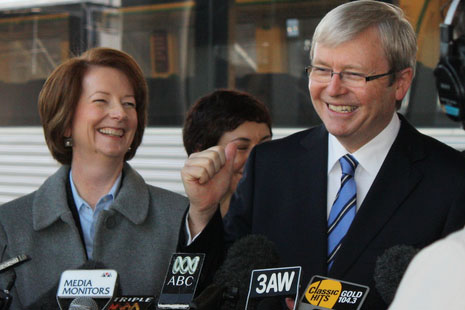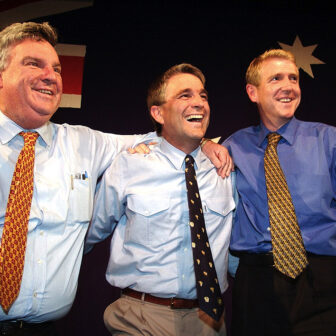THINK for a moment about all we have learned about Kevin Rudd over the past few weeks. An eminent author, David Marr, has told us the PM is motivated primarily by anger, stemming from a traumatic period in his childhood. A voice coach has told us he has an unpleasant timbre. Retailer Gerry Harvey has told us that he and his government are hopeless at selling theor achievements. Billionaire miner “Twiggy” Forrest has told us Rudd is taking the country in a communist direction. And his brother Greg has told us he is not impressed by the job he is doing as prime minister.
This is the man who a year ago was still enjoying record approval ratings, eighteen months after a sweeping election victory. His prolonged honeymoon had been accompanied by extravagant praise for his political genius, his capacious work ethic and his ability to mix social vision with practical politics.
The turnaround could hardly be more complete. It is another case supporting the view that the media are either at someone’s feet or at their throat. The man who could do no wrong can now do nothing right. Last year’s champ is this year’s chump. Rudd is no longer the man who achieved record approval for so long, but simply the man who blew it.
Interestingly, many of these critical claims surfaced in a way that meant the media felt no need to seek “balancing” perspectives. Only Forrest’s communist claim was put in the context of a controversy. Gerry Harvey’s comments, in particular, were treated with uncritical reverence as self-evident truths. A papal edict would have received more critical scrutiny.
Inspired by a sharp slide in the polls, there is now a considerable body of commentary pondering whether this could be a one-term government, the first since 1931 when, in the depth of the depression, James Scullin’s Labor government was defeated.
To my mind, the most ludicrous – and probably baseless – reporting has been about a potential leadership challenge. “Party bosses,” according to the stories, have told deputy prime minister, Julia Gillard, to challenge now.
These “party bosses” obviously don’t know their political history very well. Almost invariably a leadership challenge in government is followed by defeat at the next election. The only exception since the second world war that I can think of, in either a state or federal government, was Keating’s 1993 victory after his successful ousting of Hawke.
But it is a most improbable scenario for other reasons as well. Gillard has been centrally involved in the decisions that have attracted the most opprobrium for the government. Any semi-competent opposition would bring this into sharp public focus the moment she became leader.
So far at least, no evidence – public or semi-public – has surfaced of a breakdown in relations between the prime minister and his deputy. This is not the fourth-term Howard–Costello scenario, when personal relations had broken down and it was clear that both sides were feeding the media self-serving accounts of their grievances. This is a first-term prime minister, one who has the authority of having been the leader who won government from opposition and having since seen off two opposition leaders.
The only result from a leadership challenge now would be to ruin the prospects of two Labor leaders at once.
It is time to take a deep breath. Although currently unknown developments may always intervene, it is all but certain that Kevin Rudd will lead Labor into the next election. Despite the current polls, my guess is that the most likely result is that he will score a clear majority of seats and a clear victory (maybe 52–48) in the two-party-preferred vote. Then the media will be full of stories praising Rudd. But that praise is likely to be as unbalanced and amnesiac as the current bout of negative coverage.
If, and when, Rudd wins a substantial victory, his government and his own personal credibility will remain tarnished – and properly so – because of the somersaults and inconsistencies of the last several months. Whatever the winning margin, the support for him will be the more brittle and conditional because of his self-inflicted wounds.
His policy style and especially his penchant for political control have too often been counter-productive. The media are fixated on the crisis du jour and the weekly apocalypse; but, much more worryingly, it seems that the government is too.
The line between spin doctors and panic merchants can be a thin one. Too often the government has spun itself dizzy, and failed to achieve any sustained focus on its good news.
One example illustrates the problem. Recently published data in the OECD Factbook 2010 shows that in the period between the first quarter of 2008 and the third quarter of 2009, only three of the organisation’s thirty member countries recorded both growth in the economy and a growth in total employment. They were Australia, South Korea and Poland. Each of the others either recorded a contraction in the economy or a shrinking of the number in employment; twenty-four of these rich economies recorded both.
This is a remarkable achievement. Is it the media’s or the government’s fault it gets so little attention? •




